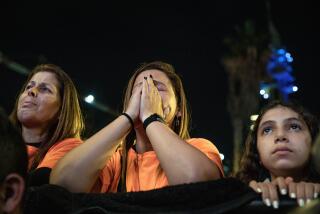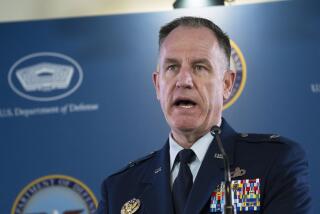U.S. Forces Are Preparing to Deal With the Psychological Casualties : Stress: It used to be called shellshock and it may strike one in four American soldiers once ground fighting begins.
- Share via
WITH U.S. FORCES, Saudi Arabia — Army commanders have been told that the anticipated intensity of ground combat here will impose a severe mental strain that could result in one American casualty in four being a victim of battle fatigue, medical officers say.
But the officers say psychiatrists now believe that the debilitating consequences of what was once called shellshock can be minimized by treatment near the battlefield and that patients in many cases can return to combat in a matter of days.
In briefings and with a new Army pamphlet, military experts have been seeking to prepare soldiers for the psychological consequences of battle, including the “exotic” reactions that a division psychiatrist here assures commanders are “normal responses to an abnormal environment.”
New studies and history suggest that the psychological toll in any ground battle here might be particularly high because it could involve an armored clash of unprecedented scope that could subject soldiers confined in armored vehicles to a high level of violence over which they have little control.
So extensive can be the impact of battle fatigue that the psychiatrist, Capt. Loree Sutton, invariably opens her briefings of officers of this 1st Armored Division by noting that combat stress maladies claimed half of Israel’s casualties in its 1982 tank-borne invasion of Lebanon.
For field officers unaccustomed to links between psychiatry and combat, “that really makes them perk up,” says Sutton, 31, of Loma Linda, Calif., whose business card, tucked in a pocket of dusty combat fatigues, carries the title “psychiatrist-soldier.”
In almost nightly briefings in the last two weeks, the captain has wryly told senior officers in the division that their “most powerful stress-management tool” will be to “inflict the most stress possible on Saddam Hussein and his army.”
But on what quickly become sober and clinical primers, the psychiatrist bluntly warns that when battle begins, a significant number of soldiers may have trouble bearing up under the mental burden it brings.
Some will turn irritable, commanders are told. Some will vomit. Others will suffer diarrhea, stare blankly, or feel the pain of old injuries. Those who suffer most severely could lose control over arms, legs or other physical functions.
In an interview, the psychiatrist said it would be “impossible to predict” what proportion of American losses could come from psychological injuries. But other medical officers said Israel’s experience in the 1973 Yom Kippur War, in which 25% of casualties were from battle fatigue, was widely regarded as a useful base line.
Briefings on battle fatigue symptoms are based in large part on a new Army “interim doctrine” issued Jan. 17 expressly for medical units preparing for their role in the war that began that day.
The principal cause of the symptoms, the combat-stress pamphlet concludes, is “sudden exposure to the intense fear, horrible stimuli and life-or-death consequences of battle.”
Officers preparing for ground war have been advised to understand battle fatigue as a “normal, temporary response to overwhelming stress” amid “the dangers and horrible consequences” of battle.
The new Army doctrine that psychiatrists hope to put into effect if ground war should come emphasizes the importance of treating battle-fatigue victims as close to their home units as possible.
Such treatment, a sharp departure from what had been the effective ostracism of the past, emphasizes the reassurance that can be provided by friends and familiar surroundings. It draws in large part on lessons learned by Israel in its recent wars, in which soldiers suffering from combat stress were found to recover most quickly when permitted to stay with their units.
U.S. commanders here have been told that with proper care as many as 80% of battle-fatigue victims could return to combat positions within three days. Only one in 20 such cases should require treatment that would make necessary their evacuation to the United States, psychiatrists say.
The message that battle-fatigue victims should not, unless absolutely necessary, be deprived of their status appears to have left some commanders puzzled. At combat-stress briefings, officers say, the most common question focuses on when a commander should take a soldier’s weapons away.
“I’m not going to second-guess you,” psychiatrist Sutton tells those who ask the question. But, she advises, “When you take a weapon and ammunition away from a soldier, he’s no longer a soldier.”
More to Read
Sign up for Essential California
The most important California stories and recommendations in your inbox every morning.
You may occasionally receive promotional content from the Los Angeles Times.










